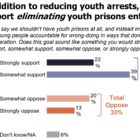
2005 – Roper v. Simmons: U.S. Supreme court rules that it is cruel and unusual punishment to impose the death penalty on people for crimes committed when they were younger than 18. “[F]rom a moral standpoint it would be misguided to equate the failings of a minor with those of an adult, for a greater possibility exists that a minor’s character deficiencies will be reformed.” Roper v. Simmons, 543 U. S. 551, 570 (2005).
2010 – Graham v. Florida: U.S. Supreme Court rules that life-without-parole sentences imposed on children for non-homicide offenses are unconstitutional. “‘(J)uvenile offenders cannot with reliability be classified among the worst offenders.’ “ Graham v, Florida, 130 S. Ct. 2011, 2026 (2010), quoting Roper, 543 U.S., at 573.“Juveniles are more capable of change than are adults, and their actions are less likely to be evidence of ‘irretrievably depraved character’ than are the actions of adults. Id.
2011 -- J.D.B. v. North Carolina: U.S. Supreme Court establishes that youth status matters in areas of youth justice beyond the context of harsh sentencing policies when it imposed the requirement that law enforcement officials must consider the age of a suspect in determining whether Miranda warnings should be issued.









